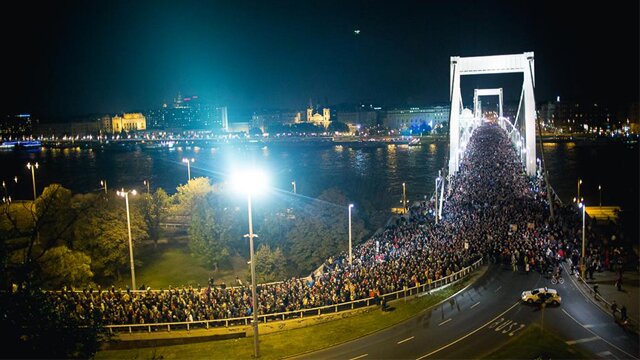
Balázs Gulyás is a young Hungarian sociologist and activist who helped organize mass protests that took place in Hungary in autumn 2014 against a government proposal to tax the Internet. Gulyás organized protests against a proposal to tax based on the amount of data transferred or “consumed”. With him, tens of thousands of Hungarians took to streets to protest, which forced the government to withdraw its plans to directly tax Internet use.
We recently had a chance to talk to Mr. Gulyás about the protests and their impact on Hungarian society, and broader subjects of Internet taxation and Internet governance. The interview took place in Budapest, Hungary, on July 12th 2015.
By: Guilherme Cintra Guimarães, PhD Candidate in Political Science at the University Roma Tre &
Sérgio Alves Jr., Executive Secretary of the Center for Law, Internet and Society at the Brasilia Institute of Public Law (CEDIS/IDP)
Please tell us a little bit about the context in which the protest took place and the reaction of the Hungarian society against the government proposal.
In Hungary, the government party, Fidesz[1], is still the most popular party. In 2014 it was re-elected in the national election and also won most of the seats in the local elections and the election for European Parliament. So, they were confident, and probably overconfident. The Hungarian government has often approved special taxes for specific sectors. Actually, it made a special tax even for the telecommunications sector. The government was very good in presenting these taxes, saying that they only affect the companies, and not the people. However, in the case of the Internet tax, the government made the political mistake of talking about how much the user would pay. So, it was obvious that this tax would also be paid by the users, even if, after a while, the government started saying that only the companies would pay, which was visibly not the case. The government proposed a tax of 150 Hungarian forints per gigabyte, which is approximately 0.50 euro. There were a lot of jokes and memes at the time saying that Hungary would be the only place in the world where it would be cheaper to buy a DVD than to download a film. Of course, a proposal for an unlimited tax would be absurd, so the government, after heavy protests, set a limit of 800 forints per person per month (approximately 2.60 euro). However, we rejected not only the amount of the tax, but also the principle behind it. It helped that in 2008 the previous government also had some ideas about this tax, while the current government party, then in the opposition, was harshly opposed to it. We could actually use their old argument against the internet tax. I think there were mainly two reasons for the success of the protests. The first was that it was visibly taking money from the people. The second was that the tax would interfere in their private sphere.
 Did the government anticipate the scale of reaction? Was it a surprise to them?
Did the government anticipate the scale of reaction? Was it a surprise to them?
It was a surprise. I think this was not a very well planned tax proposal. The government had a supermajority at the time. Probably some top government officials who don’t understand the Internet very well, came up with the idea: “let’s make some money from somewhere”, and they did not understand that this was a very stupid idea. Anyway, these two things, taking money from the people and interfering in their private sphere, were the main motivations for the protests. To implement the tax, they would have to measure the time spent, and bandwidth used, by people on the Internet. Independently of the government or the opposition, people feel that the Internet is the space where they can look for what they want without being disturbed. They think: “that’s my place, no one can say what I’m doing there”. And the tax was like someone interfering in that sphere.
In your role as one of the main organizers of the demonstrations, did social media such as Facebook, Twitter and YouTube help to mobilize citizens? For instance, how important was the Facebook page , which you set up, as a means of communication and social mobilization?
The Facebook page played a very important role, but it was not the only component that led to the success of the protests. In Hungary, Facebook is the most important social media service. The second one is YouTube. The protests were organized mainly via Facebook. We also circulated a mobilizing video on YouTube, but it was not the chief medium of communication. Twitter, Tumblr and other social media are not so widespread in Hungary. In Hungary, more than 80% of Internet users are on Facebook. The Facebook page “100.000 against the Internet tax” became very popular. Within two days it became, and it still is, one of the biggest civic-political Facebook pages in Hungary. Only the Prime-Minister’s and political parties’ pages have more fans. It was amazing, it was reaching 100.000 people within one day, and within a couple of days, more than 200.000! The Facebook protest event became the biggest Facebook political event by number of attendees that I knew of. Before that, a Hungarian civic-political event could not reach more than 5.000 attendees on Facebook. This event against the Internet tax listed 40.000 attendees. So, it was obvious that the protest would be a big one. When I saw that the page that I had founded was growing so fast, I decided to organize the protest event. It helped the success of the protest to focus only on this issue and not mix it up with other issues.
 Do you think that the Hungarian example may send a message to the governments of the world, like: “don’t mess up with the Internet”, or would this be too naïve a conjecture?
Do you think that the Hungarian example may send a message to the governments of the world, like: “don’t mess up with the Internet”, or would this be too naïve a conjecture?
Well, it depends. For example, there were some protests in Hungary against the Anti-Counterfeiting Trade Agreement (ACTA), but quite small ones. So, not every Internet issue will call the attention of society at large, even if it might affect, in theory, lots of people. The protests against the Internet tax were successful not only because the issue of the Internet was involved. I have to admit that the coverage from traditional media was important to the success of our protests. Of course, the Internet can be a very effective mechanism for organizing demonstrations. Our example was not the very first, but it was a proof of this effectiveness. So, yes, the same thing can happen in other places too, especially if there is some understandable cause. In our case, a lot of people thought that the tax was a stupid one and they did not want to pay it.
Is there still some role for traditional political practices (parties etc.) in the networked and “horizontal” protest movements of our digital age? Think about the different protest movements of the recent years: from the Arab spring to the “Occupy Wall Street”, from the wave of generalized mass demonstrations in Brazil in June 2013 to the more specific and targeted protests against the Internet tax in Hungary last year.
Well, there might be. The protests helped set up a big protest wave, which now seems to have come to an end. But it lasted for several months. It was kind of unprecedented here in Hungary – this wave of one protest after another. Thousands of people took to the streets. It helped people to engage in civic activities, to be on the stage and take part in public discussions. But it did not bring about the formation of any new parties or political organizations.
After the austerity measures that followed the 2008 world financial crisis, governments are looking for new ways to increase revenues – with an eye on the boom of the Internet economy. Do you see a difference between taxing economic activities, like e-commerce, that take place in the Internet and directly taxing Internet use itself, as the failed Hungarian proposal aimed to?
Yes, I think there is a difference. If you order a new product on the Internet, you should pay the same VAT (Value Added Tax) as when you buy it in a shop. We have to accept that governments need taxes. This is obviously not a problem. But a tax on Internet use is a very stupid thing. In our contemporary economy we cannot avoid the Internet. We need to use it and there is no reason to tax its use.
 What do you think about the idea that Internet users are not only consumers of services on the Internet and services of access to the Internet, but also consumers of data traffic flowing through the Internet?
What do you think about the idea that Internet users are not only consumers of services on the Internet and services of access to the Internet, but also consumers of data traffic flowing through the Internet?
Well, again, that is a silly thing. The government should not tax the Internet itself. The flow of data is not the same thing as the services that are provided. This actually raises questions of whether it is acceptable that the government knows how much data someone accesses, and whether this is private information. Based on the amount of data accessed, and the time of access, it is possible to make inferences about someone’s lifestyle, which is something that I think the government should not necessarily know about. Moreover, if an Internet forum decides to run more ads, why would someone using the forum to express his ideas be taxed more? So, the idea of taxing the consumption of data makes no sense at all.
How important is it for governments and the international community to take multilateral and combined action against tax avoidance in our globalized economy, given that Internet companies like Google, Amazon and Facebook are amongst the most active users of tax avoidance techniques that take advantage of international legal loopholes and tax heavens to pay less taxes?
I think tax avoidance is a problem. In fact, it is a growing problem. If you advertise in a printed newspaper, you pay the normal VAT. But when you advertise on YouTube, Facebook or Google, you may choose which VAT to pay. For example, the Irish VAT, which is about one fourth of the Hungarian one. This can be problematic, especially because the internet economy is growing and it is not fair to other economic sectors. In the Internet age, tax havens are even more problematic, because you may set up an offshore company without even having to travel there. There is a need for multilateral action, because companies can easily move from one country to another. But it is also a difficult issue. Even in the European Union, taxation remains mostly a national problem.
Lets finish the interview with a more “existential” question, if we can. Although the Internet and social media offer immense benefits in terms of innovation and broaden access to communication, they are sometimes criticized for isolating people from each other, given that more and more people spend most of their time in front of their screen(s). I am thinking specifically about some hypotheses raised by the American-German Professor Hans Ulrich Gumbrecht at Stanford University. He suggests people are connected through their minds, but isolated in terms of their bodies, their physical presence in the world. Would it be possible to see in this wave of protests and demonstrations of the last years as some kind of “will of presence”, a concrete and bodily presence? As if interaction in cyberspace were not enough, and people would also like to be present together in the real space with their concrete bodies? That is to say, along with more immediate political reasons for protest and demonstration, is there also an “existential” need of “presence” that makes people take to the streets instead of only “sharing” and giving “likes” online?
Well, that is a complex question! People tend to think that if you go on the streets, that this is a real thing. Giving a “like” on a Facebook page is not so much. This was true in our case, because we had more than 200.000 likes in our Facebook page, which was a way of saying that you were against the Internet tax. But the government did not roll back. The government only rolled back after the second mass protest. So, it seemed that physical protests were taken more seriously. If you think about it, the physical presence requires more investment. To go to the streets, you have to give up two to four hours of your time. It is not as easy as just giving a “like” on a protest page. Furthermore, it was not only the government which felt that the physical protest was the real one, but also people themselves. We had a very high attendance rate on the Facebook event. And there were lots of people, tens of thousands of people in the first protest. But in the second protest there were even more people who came, in part because they saw that the first protest was big, it was a serious thing. People may think that a small protest is not worth going to. But if they realize: “oh, there are a lot of people”, they might think: “I want to be a part of this too”. This may strengthen the idea of people really wanting to be present in a concrete, physical event.
* This interview was prepared in the context of research activities carried out at the Center for Law, Internet & Society of the Brasilia Institute of Public Law (CEDIS/IDP). CEDIS/IDP is an academic research center dedicated to the interdisciplinary research on the Internet and new technologies of information and communication, especially on the legal, economic and social challenges of the information society. CEDIS/IDP and the Beta Institute for Internet and Democracy (IBIDEM) will organize the workshop “A Double Irish, a Dutch Sandwich and a Caipirinha, por favor: a tale of Internet taxation” at the Internet Governance Forum (IGF) that will take place in João Pessoa, Brazil, from 10 to 13 November 2015. This will be the first IGF panel to deal specifically with the political, regulatory and technical issues related to taxation on the Internet global ecosystem.
* This interview has been edited and condensed by The iii. It is also published in Portuguese in the online legal news media JOTA on August 6th 2015.
[1] Fidesz (“Magyar Polgári Szövetség”, in English: “Hungarian Civic Alliance”) is a conservative right-wing party that won the Hungarian national elections in 2010 and 2014 with a supermajority on a joint list with the Christian Democratic People’s Party (“Kereszténydemokrata Néppárt – KDNP”).
Hungary, internet tax, interview